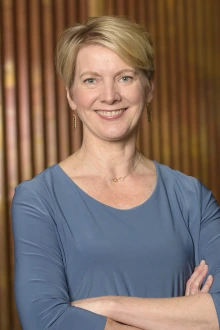Dr. Felicia Goodrum Receives Emerging Visionary Award
Felicia Goodrum, PhD, a professor of immunobiology at the University of Arizona College of Medicine – Tucson, was named the 2022 Edith Sayre Auslander Emerging Visionary by the University of Arizona’s Commission on the Status of Women.
The award is given to a faculty or staff member who advances the commission’s goals relating to campus climate, career and professional development, and issues of equity and inclusion. Dr. Goodrum was honored for her commitment to diversity, equity and inclusion, as well her mentorship of students and junior faculty.

Felicia Goodrum, PhD
Hina Arif, MD, a professor and vice-chair of medical imaging with additional appointments in medicine, surgery and pathology in the College of Medicine – Tucson as well as the assistant dean of Women in Medicine and Science (WIMS), nominated Dr. Goodrum for the award.
“Dr. Goodrum is an outstanding scientist with an impressive, strong and impactful vision on diversity and inclusion of underrepresented groups in science and education,” Dr. Arif said. “She has emerged as a promising leader who leads by example. About 50% women and 30-40% underrepresented minorities constitute her lab. She serves on junior faculty mentoring committees of all female faculty, with most from underrepresented minorities. She has cultivated a culture of diversity amongst faculty, students and staff.”
Dr. Goodrum, who is a member of the university’s BIO5 Institute and the UArizona Cancer Center, said empowering underrepresented groups and diversity, equity and inclusion efforts are important to her because of her experience.
“I often heard that I could not do something because I was a girl. I heard that so much growing up, that I am sometimes really surprised to see where I am,” she said. “I know without a doubt the reason that I have become an independent scientist and risen to leadership positions is because of teachers and mentors that helped me believe I had things to contribute and could do this. I want to be that for others.”
Dr. Goodrum believes the most impactful thing she does is one-on-one mentoring with women, students and junior faculty from diverse backgrounds.
“I think anything we can do at that personal level has huge benefits,” she said. “I want to help those who cannot easily see themselves in science or leadership, to see it. Representation is so important to knowing you can get there. I want to help build that representation.”
To widen her diversity, equity and inclusion reach, Dr. Goodrum has utilized her role as president, and now past president, of the American Society for Virology and as the current co-editor-in-chief of the Journal of Virology to encourage and build more diversity in the field of virology.
“It is critical that my diverse trainees see people like themselves achieving,” she said. “When I organize meetings, I give great attention to the diversity of the invited speaker roster. We are also working to increase the diversity of people reviewing and editing scientific manuscripts. My hope is that in five years or less, people from underrepresented backgrounds in science will not feel that they are the only one or one of few when attending any scientific conference or looking at any editorial board.”
The Commission on the Status of Women is a well-established advocacy arm of the University of Arizona that actively champions a just, equitable and inclusive campus. The Commission shapes policy, addresses current needs and promotes the advancement of all gender identities. The Commission on the Status of Women is directly connected to the University’s Diversity Coalition.

